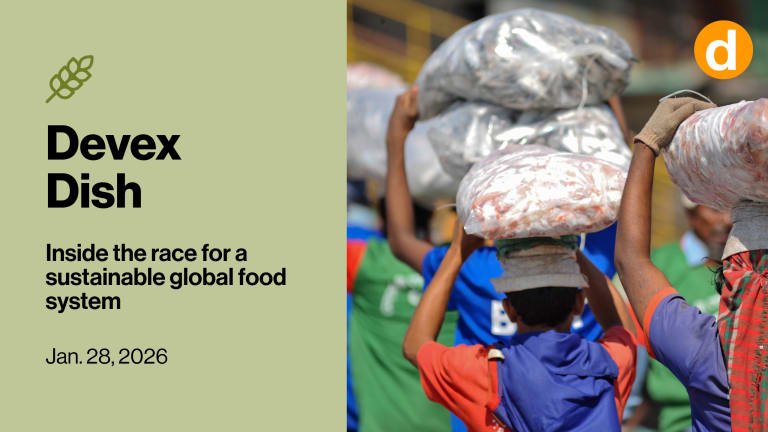Private sector emerges as key partner in food aid
<p>For development practitioners and nonprofit organizations looking to work in the burgeoning arena of food security, the private sector opens an alternative – and often quicker – avenue to success.</p>
For development practitioners and nonprofit organizations looking to work in the burgeoning arena of food security, the private sector opens an alternative – and often quicker – avenue to success. Public donors increasingly are counting on the business community to help meet the first Millennium Development Goal of halving hunger by 2015. Ahead of the World Summit on Food Security last November in Italy, the United Nations convened a forum to kindle cooperation with major companies involved in the global food chain. >> Top Food Security Groups: A Primer “We would like to emphasize that the many possible initiatives the private sector might undertake can only be effective within a broad strategy that brings together all stakeholders,” participants at the U.N. forum said in a joint statement. “We consider that strong partnerships are critical, and that there are important untapped opportunities for partnerships involving farmers, the food industry, governments, international organizations, NGOs, and donors.” Such partnerships are increasingly common around the world. In October, nonprofits and food producers were for the first time represented at the the Committee on World Food Security, an U.N. body spearheaded by the Food and Agriculture Organization whose influence on global food security is expected to rise. In the United States, President Barack Obama’s Feed the Future initiative counts the private sector as a key ally. >> Civil Society Gains Unprecedented Power in Premier UN Food Security Body >> The US View on Global Food Security: A Conversation with Ertharin Cousin “An innovation we’ve seen is more engagement with the private sector as a partner,” said Brad Buck, director of the international development division at Land O’Lakes. “I don’t think it’s entirely new – USAID has been doing private sector-oriented development for years and years – but what’s changed is having it a more explicit part of the program.” The private sector brings innate qualities that public institutions and civil society organizations often lack, according to Lynn Salinger, a principal associate at Nathan Associates and teacher of food policy and international food and agricultural trade at Tufts University’s Friedman School of Nutrition Science and Policy. “The private sector typically understands how to link people and food, and knows how to deal with market irregularities or how to broach logistics challenges,” she said. “Nathan is doing work in export promotion areas, where we are helping those who grow and collect food at country level to bring that out to regional and international markets, and that’s an important contribution of private sector companies.” The private sector’s involvement in food security-related development goes far beyond making money and cutting checks, according to Jeff Simmons, director of Elanco, the animal health unit of pharmaceutical giant Eli Lilly. “We can bring the experts, we understand animal diseases and animal husbandry,” he said. “Personnel contributions have to be a significant percentage of corporate contributions.” Among other corporate social responsibility initiatives, Elanco channels its human resources to a partnership with Heifer International, an NGO that provides livestock to poor communities around the world. These sorts of opportunities, Simmons said, foster employee engagement at companies like Elanco. “When you talk about engagement, you can really learn from NGOs,” he said. “There’s a lot of volunteers and it isn’t about the salaries, it’s about the grander purpose.” In selecting Heifer as a partner, Elanco evaluated more than 20 NGOs and determined a match using criteria such as capacity, sustainability and common philosophy. Land O’Lakes also considers shared purpose as a crucial element in identifying partners, according to Buck. “We’re very business-oriented, so NGOs that have that frame of reference are the ones we tend to work more with,” he said. “A second piece is if they have their own unique expertise. There might be an NGO out there that [is] just fantastic with the practices at the farm level that are very applicable to the work that we do.” Often, the development community is trying to impose its agenda on the private sector instead of co-opting companies’ competitive advantages, Buck said. “We should be asking the private sector where they’re going, where they want to invest, what market opportunities they see and programming around where the private sector is going,” he added. In Malawi, he noted, Land O’Lakes took an initial investment of $2.5 million from the U.S. Agency for International Development, and raised $9 million more from other public, private and civil society organizations interested in creating a viable dairy sector. The project, which enabled a processing company to start a loan program for farmers, quickly attracted support from banks, suppliers of farm inputs, and breeding farms, among others, Buck said. “It kind of illustrates how US government or public resources can be leveraged through local partners, governments, other donors, other NGOs and the private sector to magnify the impact,” he said. “And it’s sustainable because it’s all market-driven.” Read more about the U.S. Feed the Future initiative. Read more food security business news: - Wanted: Partners to Help Communities Feed Themselves Read more international development business news.
For development practitioners and nonprofit organizations looking to work in the burgeoning arena of food security, the private sector opens an alternative – and often quicker – avenue to success. Public donors increasingly are counting on the business community to help meet the first Millennium Development Goal of halving hunger by 2015.
Ahead of the World Summit on Food Security last November in Italy, the United Nations convened a forum to kindle cooperation with major companies involved in the global food chain.
>> Top Food Security Groups: A Primer
This story is forDevex Promembers
Unlock this story now with a 15-day free trial of Devex Pro.
With a Devex Pro subscription you'll get access to deeper analysis and exclusive insights from our reporters and analysts.
Start my free trialRequest a group subscription Printing articles to share with others is a breach of our terms and conditions and copyright policy. Please use the sharing options on the left side of the article. Devex Pro members may share up to 10 articles per month using the Pro share tool ( ).
Josh joined Devex's Washington office in early 2010 as an international development correspondent covering U.S. aid reform, the D.C. development scene and Latin America. He previously served as a marketing communications coordinator for TechnoServe, a news production specialist for the Associated Press and a news desk assistant for the PBS NewsHour. He has reported for publications in Caracas, Chicago, Madrid, New Delhi, Philadelphia, and Washington, and holds a bachelor's degree from the Medill School of Journalism at Northwestern University.








